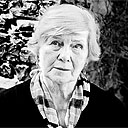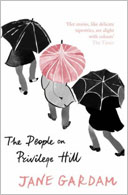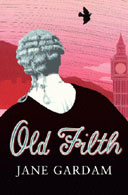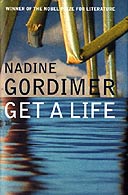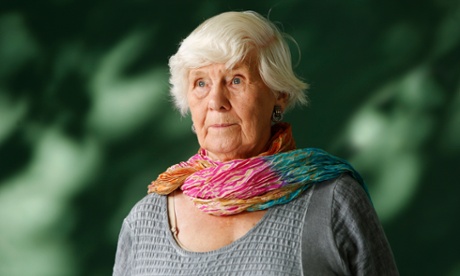Although Jane Gardam did not publish her first book until she was in her late 30s, writing has always been a part of her life. "I just knew I would be a writer," she says. "It just seemed the only sensible thing to do." As a child, she scribbled secret stories which she hid in the chimney in her room. "Then I got chicken pox. In those days in Yorkshire, you never had a fire in your bedroom unless you were very ill. They lit a fire. My hand went up and I brought down cinders. Never mind. It wasn't much good, I shouldn't think."
The way she tells this story - succinct, vivid - is typical. The intensity of a childhood loss, painful at the time, is still detectable beneath the layers of adult detachment, humour and resignation. Gardam's fiction has often been concerned with the child's or adolescent's eye-view, and with the relationship between the interior life, built up of buried memories and fantasy, and the public faces we adopt to get through everyday existence. Her most recent novel, Old Filth (2004), nominated for the Orange prize this year, tells the story of an elderly international lawyer finally catching up emotionally with the traumatic childhood experiences he has tried to forget, but which have formed his character. (The title is a jokey acronym the protagonist applies to himself, standing for "Failed in London, Try Hong Kong".)
Now 77, Gardam is a window on to the past. The image of the little girl desperately thrusting her hand up the chimney, of chicken pox as a serious illness, of a fire rarely lit in a cold Yorkshire bedroom, is almost Victorian. This is something that could have happened to the Brontë sisters, whom Gardam mentions, along with Hardy and Dickens, as novelists whose works have nurtured her imagination.
Gardam's dismissive attitude to her childhood writings - "all rubbish" - reflects the very English, no-nonsense modesty with which she talks about her work more generally. But she is one of the most prolific novelists of her generation, with 25 books published over the past 30 years and a number of prestigious prizes to her name. She is the only writer to have won the Whitbread for best novel twice (for The Hollow Land, 1981, and The Queen of the Tambourine, 1991); she has been nominated for the Booker (for God on the Rocks, 1978); her short stories and children's fiction have also won prizes; and in 1999 she was given the Heywood Hill award for a lifetime's contribution to the enjoyment of literature.
The sheer quantity of work that has poured from Gardam's pen suggests a quiet confidence beneath the self-deprecation. As her friend, the American novelist and critic Alison Lurie, puts it, Gardam has never been "pushy" nor tried to promote herself as a personality. "As with other English writers of her background, such as Margaret Drabble, she's always refused to make a parade of being better or more sensitive than others because she writes books. She sees things in a more basic way." As her long-standing editor Penelope Hoare says: "She's not one of those writers who's into publicity. She prefers long walks. She genuinely leads the life of the writer, an interior life."
Gardam's self-containment doesn't prevent her from appreciating recognition - "I hadn't expected it at all but I can't help enjoying it," she confesses of reaching the Orange prize shortlist. This contrasts with the comments of Lionel Shriver, who won on the day and has contrasted her own "naked ambition" and will to win with the more ladylike generosity of the other shortlisted candidates. Gardam certainly does not give the appearance of having that careerist drive for public success. This may partly be explained by the fact that she has never had to earn her living from writing. Her husband David's career as a distinguished QC - a "very well-paid" profession, according to Gardam - presumably means that it was he rather than she who was the breadwinner, though things were, she says, financially rocky in the early years of their marriage, before she became a novelist, when he was establishing himself at the Bar. Gardam is the sort of person who makes you feel it would be indelicate to raise the issue of money in connection with her work. Yet without a strong financial motive, what is it that has kept her producing books with such astonishing regularity, when she could so easily have slipped into the comfortable life of the upper-middle-class housewife?
She grew up in Cumberland and the North Riding of Yorkshire - places which emerge and re-emerge in her fiction - and remembers her existence as "luminous, almost deliriously happy" until the age of six, when several traumas shattered this Eden. The first was an accident, "my own fault," she says, which - like the incident with the childhood writings up the chimney - involved fire. Having returned from a children's party, the six-year-old leant back towards the fireplace, chattering excitedly, thinking the guard was there in its usual place. It wasn't. Her hands were burnt "to the bone". She has the scars to this day, and is "sensitive" about them, hugging her hands to her sides as she speaks to hide them.
Soon afterwards, Gardam's younger brother was born. Most first children feel displaced by the arrival of a rival, but in her case, the feelings were intensified by the fact that her mother immediately afterwards caught scarlet fever, was taken away to hospital and nearly died. "My father lay down on the drawing-room carpet - grey and woven with full-blown roses I suddenly remember - and howled like a dog. I sat in the corner of the sofa and watched, before being rescued by two great-aunts - Fanny and Beatrice - who scooped me up and fed me humbugs and read me Tennyson's 'Queen of the May', not the wisest choice, being all about the death of a maiden." When Gardam's mother finally came home, "she was not pleased enough to see me. That was the end of the happy little girl."
Literature helped the six-year-old to transcend, or transfigure, the horrors of real life. She suggests that one of the reasons she survived was "because before this dark year, my father and I used to sit on the sofa as he read Hans Andersen to me", creating a bond, via books, which was subsequently lost in her relationship with him. Gardam's father, William Pearson - "a strange man," she calls him - was obviously a powerful figure in her life, but someone whose approval she never really felt she could gain. He was a maths teacher at a boys' boarding-school, Sir William Turner's, in Redcar. Boys' schools feature in a number of Gardam's novels, particularly Bilgewater (1977). "He was bitterly disappointed I wasn't a mathematician," says Gardam. "He never got over the fact that I wasn't clever . . . I hadn't the mind. That was really upsetting." Her brother, however, was good at maths, and later cemented his bond with his father's side of the family by becoming, like his paternal grandfather, a farmer.
The awkward child who feels alienated or whose talents go unrecognised recurs in Gardam's fiction. In her personal favourite of her books for young teenagers, The Summer After the Funeral (1973), Phoebe is considered a problem, unable to learn to read and sent unwillingly to psychologists. Yet the literary ability that has been dormant in her suddenly bursts through and she becomes a passionate reader and writer. Gardam never had difficulty with language; she taught herself to read when very young from Beatrix Potter, though, she says, the adults never believed that she could. But Phoebe's sudden sense of empowerment at 12, when she writes down her own story, is reminiscent of Gardam's experience when it became clear, to everyone's surprise including her own, that she was intelligent after all.
"I remember leaning over the stairs to listen to what my English teacher was saying about me to my parents and overhearing her say: 'She could do her school certificate now.' I was only 12. I thought 'Hooray!' I'd been so much squashed down." At 17, when Gardam won a scholarship to London University to read English at Bedford College, her father was pleased, but only because it meant he could hold his head up in the staff room. She now thinks that "being a little girl who was succeeded by her brother and not supposed to be good at anything" must have spurred her on in the long term. But even as a successful adult novelist it seems that her father's approval was beyond her reach. "All he had to say when I was shortlisted for the Booker prize for God on the Rocks [in 1978] was that he'd enjoyed Hotel du Lac, which was by a pretty girl."
Gardam at 77 is in fact a pretty woman, well preserved, with an open face, sparkly blue eyes, and thick, glossy blonde-white hair. She appears at the door of her house in Sandwich in a straw hat and loose white linen trousers and green shirt, eager to welcome a visitor. The Gardams have three houses: the "monster of a beat-up house" in Wimbledon where they brought up their three children, a cottage in the Pennines, and this, the aptly named Haven House. On a narrow street in the small Kent coastal town, its grey-painted façade, wide, dead and flat, with a classical pediment over the door, makes you think the interior will be as square and boxy as a doll's house. Inside, however, though the rooms are large, it is a higgledy-piggledy warren, which, despite the spacious 18th-century hall with its imposing staircase, in fact dates back in parts to the age of Chaucer. At that time, says Gardam, it was an inn catering to pilgrims on route to nearby Canterbury, and she likes to think that the author of the Canterbury Tales stayed there himself.
The house is decorated in an unflashy way with old furniture rather than antiques, and there is something magical about its walled garden. From the street, you would never imagine this townhouse to be hiding such a large expanse of nature. In fact there are really two gardens linked by an archway in the wall - originally the medieval city wall: a formal rose garden with box hedges and a small summer house, where Gardam chooses to be interviewed, and a larger one with a lawn, herbaceous borders, and crumbling statuary.
This southern idyll could not be more different from the desolate landscape of the north Yorkshire coast where Gardam was brought up, whose weird beauties she celebrated in her only non-fiction book, The Iron Coast (1994), and particularly in the novel which critics tend to mention as her finest, Crusoe's Daughter (1985). Although it never won any prizes, it is also the one Gardam points to when pressed to say of which of her books she is proudest (though she typically brushes off the question with the retort: "I don't know about proud").
Crusoe's Daughter tells the story of Polly Flint, metaphorically marooned for 80-odd years in the yellow house on the bleak coast to which she was taken, early in the 20th century, as a child. For Polly, the world of books - specifically Robinson Crusoe, with which she is obsessed and with whose hero she conducts a lifelong dialogue - becomes a life-saving source of nourishment. For her, the worlds of the imagination and reality have a thin skin between them, and the former becomes almost like an alternative religion. In one of their final exchanges, written as a dramatic dialogue, Polly says to Crusoe: "Fiction isn't memory." "But memory is fiction," he replies. The novel draws on much of Gardam's own background. "In a way it's about my mother," she says of Crusoe's Daughter, "and has a lot to do with a girl not being educated, when if she had been a boy the money would have been found."
Gardam's mother, Kathleen Mary Pearson, was as dominant an influence as her father, if not more so. In Gardam's writing room - a cool, shady space with one small oblong window framing a blindingly bright view of the garden - is a photograph of her mother taken in childhood, showing a girl of about 10, with frilly bloomers protruding beneath an Edwardian sailor suit, standing half-defiant, half-timid by a stream ("My mother hated that picture because her knickers were showing!"). Like Polly Flint, Gardam's mother was the daughter of a sea captain and she grew up with a voracious love of language but no formal education. "She could write. Wonderful letters of the kind you hardly ever get now and they were compulsive. She wrote all the time, endlessly. She'd just say to any child in the street, excuse me could you just take this letter to the post. And she was always writing sermons."
Religion was the centre of Gardam's mother's life, and it crops up in most of Gardam's novels in some form or another. "Mum was a tremendous Anglo-Catholic. Very impressive, actually. She made me go to church for years - I still don't want to because of that." If this suggests a source for Polly Flint's youthful rebellion against her pious aunts, it doesn't mean that Christianity is something Gardam has rejected in adulthood. She still values her mother's influence: "I had the prayer book instilled into me without trying - a great present to give a child." Nowadays, Gardam says, "I veer between being a Quaker and my ingrained Anglo-Catholicism." Religion has been a comfort in the face of family tragedy. In 2002, Gardam's eldest son Tim - who has recently become principal of St Anne's College, Oxford, after a successful television career - lost his wife Kim to cancer, leaving a 10-year-old daughter. "She coped better than any of us," says Gardam of her daughter-in-law. "She became a Christian, though she'd been a vigorous atheist at Cambridge." In Old Filth, the rationalist, determinedly non-religious protagonist achieves some semblance of grace only after he makes a confession to a priest.
Gardam made a decisive break from her parents when, just after the war, she left Yorkshire for London to get the university education her mother had never had. Her novel The Flight of the Maidens (2000) deals with that coming-of-age phase in her life, and is partly inspired by two German Jewish girls she met at Bedford College who had escaped on the Kindertransport. Gardam was, and still is, fascinated by their spiritual strength and capacity for survival.
Between leaving university and marrying and having children, Gardam worked in a number of literary related jobs, starting off as a Red Cross Travelling Librarian for hospital libraries. This, she feels, was invaluable experience for her future as a novelist; it showed her what people really want to read when they genuinely need an imaginative escape. Then, she went on to become a journalist, first as a sub-editor on the Weldon's Ladies' Journal and then as assistant literary editor at Time and Tide under Veronica Wedgwood, which, she says, was a "wonderful" education, teaching her about précis and cutting. (She still reviews books for the Spectator, which she regards as an invaluable discipline.) After the birth of her first son in 1956 she gave up work; only when her last child went to school did she concentrate on writing fiction.
Bringing up her three children - Tim, Kitty and Tom - in Wimbledon during the 60s and 70s was sometimes a lonely business for Gardam, as her husband's legal work took him abroad, often for months at a time. "When he was in Bangladesh for six months there were only three telephone lines out. And the president took one. So then there were only two. It was awful, really. Really hard. It made me stand on my feet, though." Things got particularly bad the year Gardam's younger son Tom "was found to have a hole the size of a duck egg in his thighbone and the diagnosis was dire. I realised my flimsy hold on sanity then. I became entirely a mother, and no doubt something of an emotional burden to him. But he became an Alpine climber at 20 and is still around."
Gardam spent about 15 years of her life concentrating on motherhood. "Only a great genius like the Victorian novelist Elizabeth Gaskell can be mother, wife and novelist without solitude," she believes. "I couldn't write until my youngest child went to school, and then I began - the first morning - and I've never stopped. For years there was no man in the house when my husband was off on law cases in the Far East. Without writing I would have been bored and unfaithful, maybe both, and the children would have been hideously over-protected."
Gardam began her fiction career with a children's novel, A Long Way From Verona, and a book of children's short stories, A Few Fair Days, both published in 1971. It was in 1975 that her first work for adults, the prize-winning collection Black Faces, White Faces, came out. All set in Jamaica, which she had visited with her husband in the course of his legal work, these stories have a jewel-like precision reminiscent of Katherine Mansfield and are characterised by keen observation, understatement and stylistic clarity.
When Gardam published her first fiction, her old tutor from Bedford College, the celebrated Victorian specialist Kathleen Tillotson, told her that she'd always known she'd be a novelist. "I said, why didn't you tell me! I wouldn't have wasted all that time on the academic stuff," recalls Gardam. As a student she had planned to become a literary scholar and had done one year of a PhD, researching the classical background of Lady Mary Wortley Montague because she wanted to know how much Latin and Greek this extraordinary 18th-century figure had actually had. Lack of funds forced Gardam to give up the thesis; she was thrilled when, in 2003, she was awarded an honorary DLitt from the university of Teesside, as it laid to rest the nagging regrets she'd always felt about the doctorate. Her youthful studies in 18th-century literature have clearly had an impact on her work, most obviously in the heroine's Defoe obsession in Crusoe's Daughter
The way past influences work their way through Gardam's literary imagination is, however, not always straightforward. Apparently tangential, random images can resurface years later in different forms, their connection to their real-life contexts severed. As she recalls a visit she made at 21 to a descendent of Montague's in search of material for her thesis, it strikes her that she's discovered the source for an image - that of the "guilty pearls" - that she used in Old Filth. In real life, the eccentric Montague descendent, a married man, had tried to seduce her and offered to buy her better pearls than the Woolworth's ones she was wearing. In the novel, the pearls have been given to the protagonist's wife by her lover.
Gardam's use of the pearls in Old Filth was singled out by reviewers as an example of her subtle narrative skills. On the day before her death, the wife buries the lover's pearls in the garden with the tulips she is planting. Her marriage has been barren, literally childless and passion-free. But when, sometime later, a child looking for a football finds the necklace, Gardam gives us a beautifully understated symbol, in the words of novelist and critic Amanda Craig, "of the way gifts get passed on unknowingly". The critical reception of Old Filth revealed how much Gardam is admired by her fellow women novelists, with younger writers such as Craig and Stevie Davies queuing up to express admiration for her storytelling ability. Another novelist, Maggie Gee, put it like this: "The writing crackles with energy, variety, sensuous richness. It is the writing of a 25-year-old with the wisdom and subtlety of a razor-sharp 100-year-old."
Gardam's method, when it comes to planning a book, is often to start with an image, sometimes a startlingly banal one. In the case of Old Filth, it began when she saw that her daughter's neighbours had attached a length of plastic tubing to the gate at the end of their drive for the delivery boy to put the daily newspaper in. This tube haunted her imagination, and from it she built up a picture of two neighbouring houses and then of their inhabitants, two elderly men, both ex-lawyers, who had loved the same woman. From here, the story opened out in her head and the childhood and subsequent career of her main character began to take shape. "I don't have a story in my head to begin with," Gardam explains. "I vaguely know but I can't say more than that. I brood and think, apparently doing nothing for ages and then I write in a huge frenzy."
According to Hoare, "she writes these organised, well-constructed books but they grow organically. You never know where it's going until it's written. The characters lead her. She talks about them as if they are real people, something readers pick up on. She often gets asked at literary events what happened to so-and-so after the end of the book." But Gardam shies away from pinning things down, and it was only at Hoare's suggestion that she inserted a letter towards the end of Old Filth which finally reveals the precise nature of her character's secret. "Maybe she is sometimes too subtle," Hoare says. "She hates explaining. She wants to keep the interpretation out of the books. She doesn't want to tell the readers what it means, as if that would take the bloom off."
Although Old Filth was published at the end of last year, Gardam is still taken up with it, still thinking about the characters. But she's also moving on, having set to work on a group of short stories set in Sardinia. "I write on," she says. "I've signed contracts for two new books. I'm so thankful for good health, the misshapen hands that still keep going and the comfort of the alternative fictional worlds I inhabit. I have a rather better time there, I think, than in what's called 'the real world', which has always seemed a bit of a fiction, to me anyway."
Jane Gardam
Born: July 11 1928, North Yorkshire.
Education: Saltburn High School for Girls; Bedford College, University of London.
Married: 1954, David Gardam, 3 children.
Children's books: 1971 A Long Way from Verona, A Few Fair Days; '73 The Summer After the Funeral; '77 Bilgewater.
Short stories: 1975 Black Faces, White Faces; '83 The Pangs of Love; '94 Going into a Dark House; '97 Missing the Midnight.
Novels: 1978 God on the Rocks; '81 The Hollow Land; '85 Crusoe's Daughter; '91 The Queen of the Tambourine; '96 Faith Fox; 2000 The Flight of the Maidens; '04 Old Filth.
Non-fiction: 1994 The Iron Coast.
Some awards: 1975 David Higham, Winifred Holtby awards; '84 Katherine Mansfield award; '89 Prix Baudelaire; '91 Whitbread Novel award; '95 PEN/Mac-millan Silver Pen; '99 Heywood Hill award.
